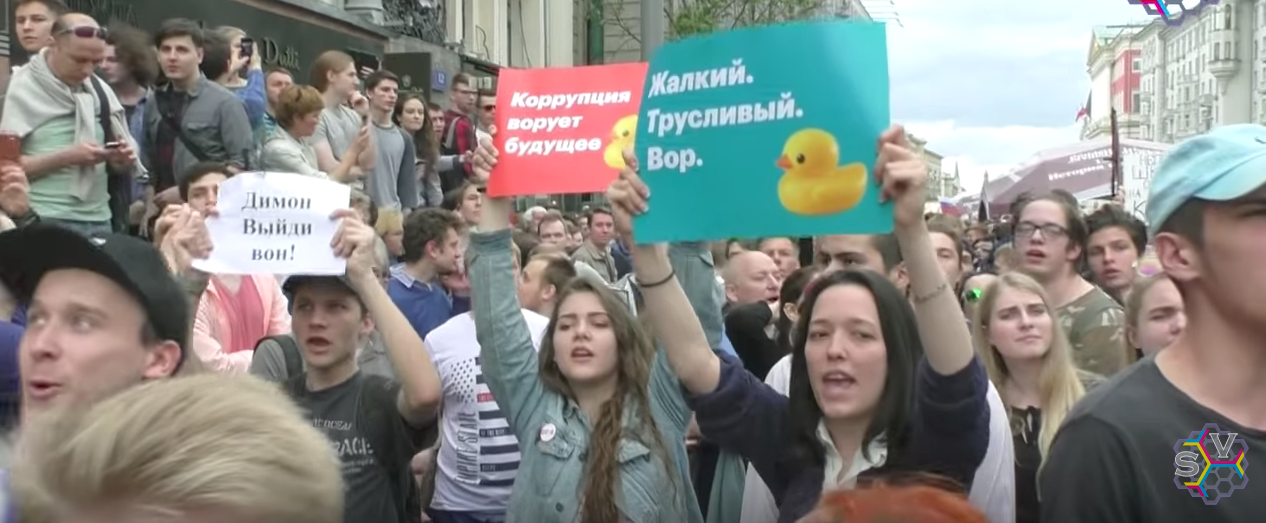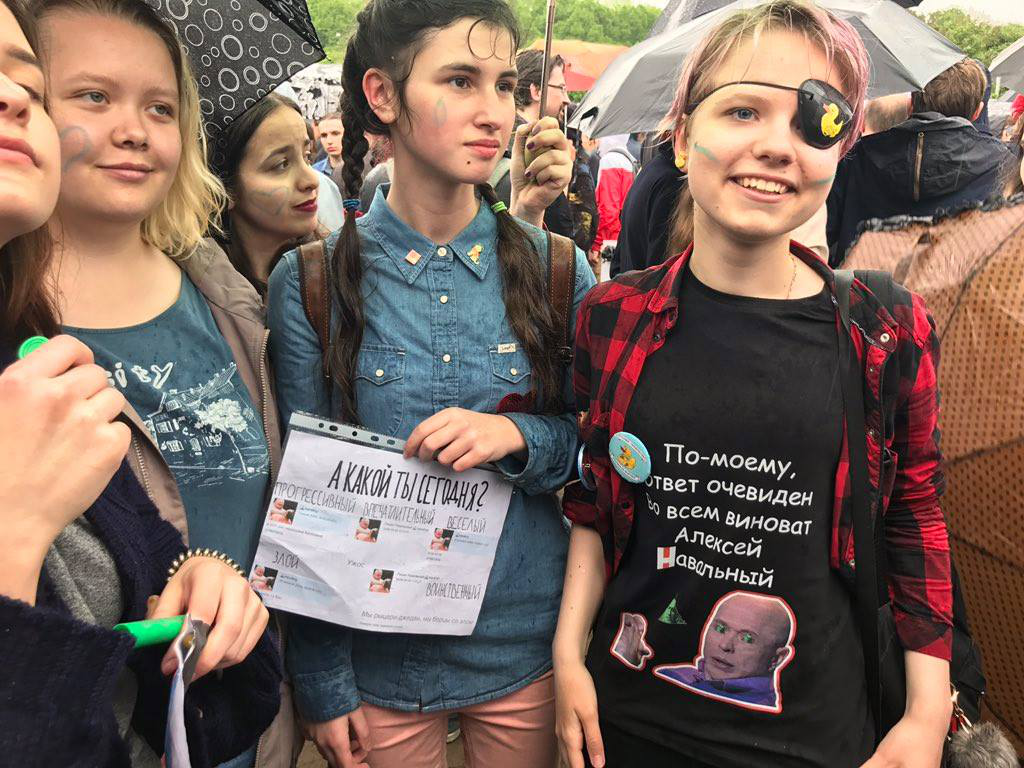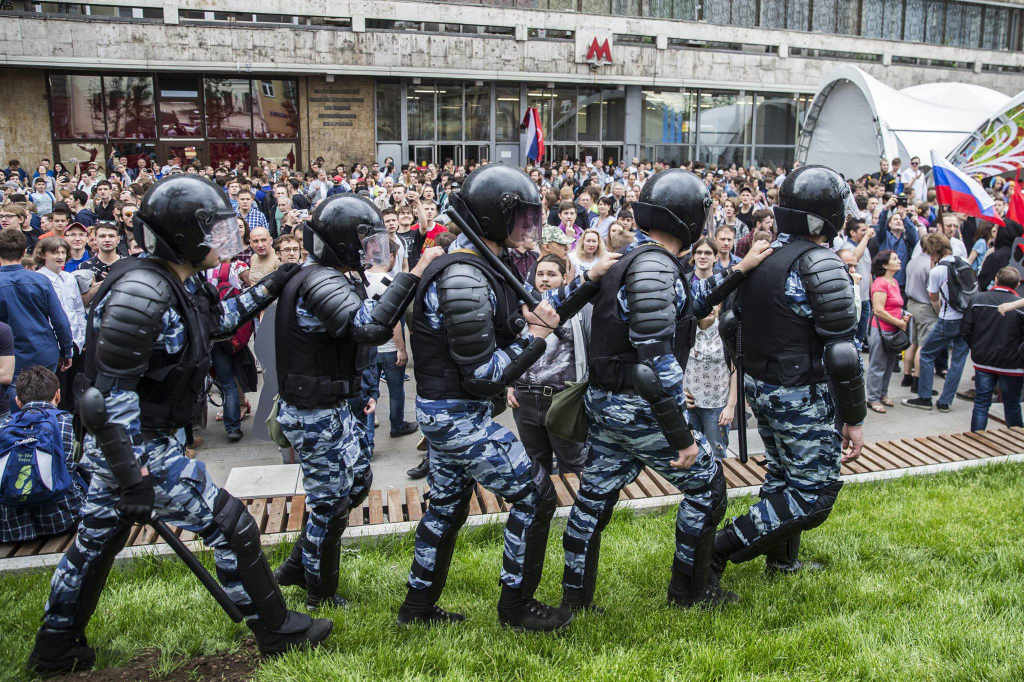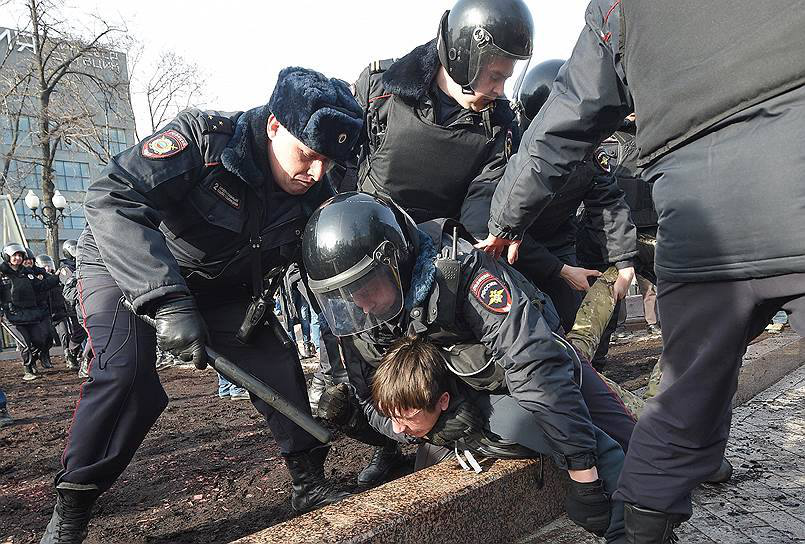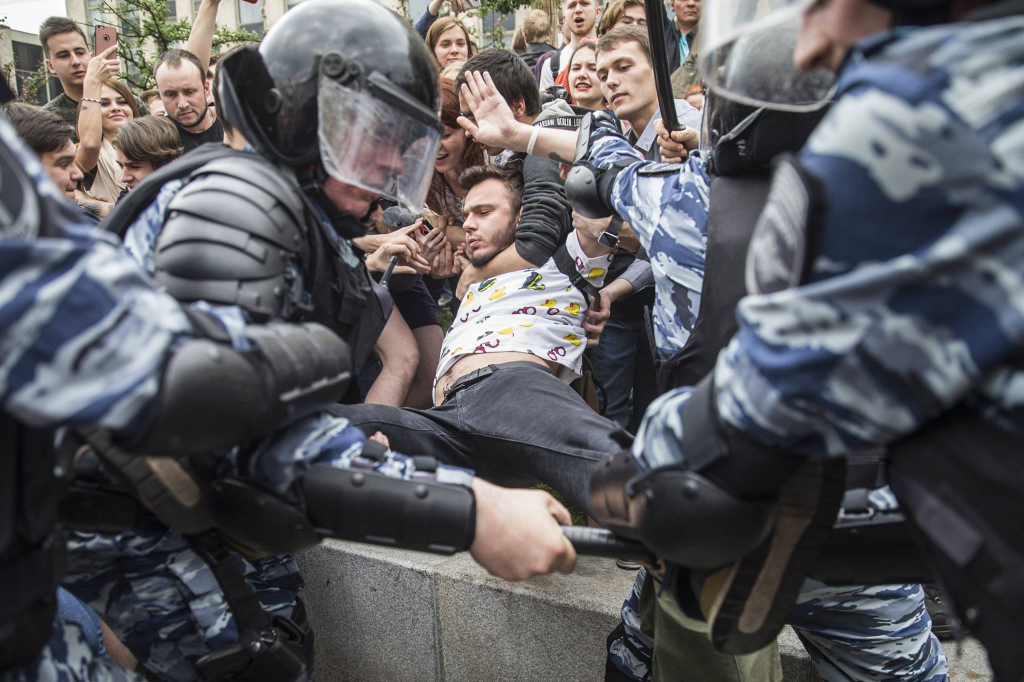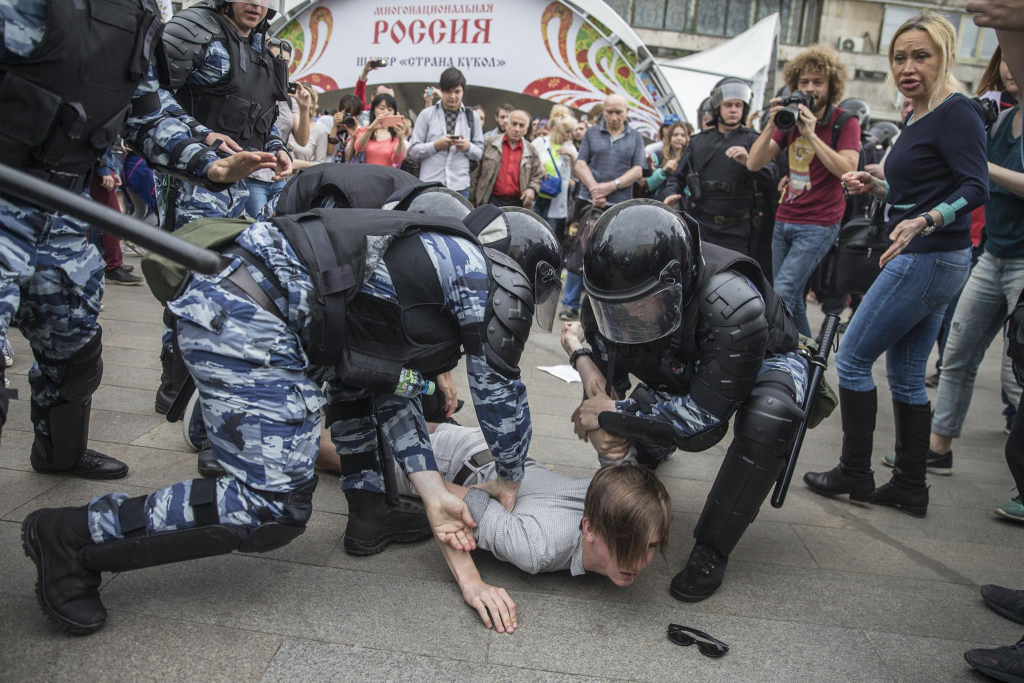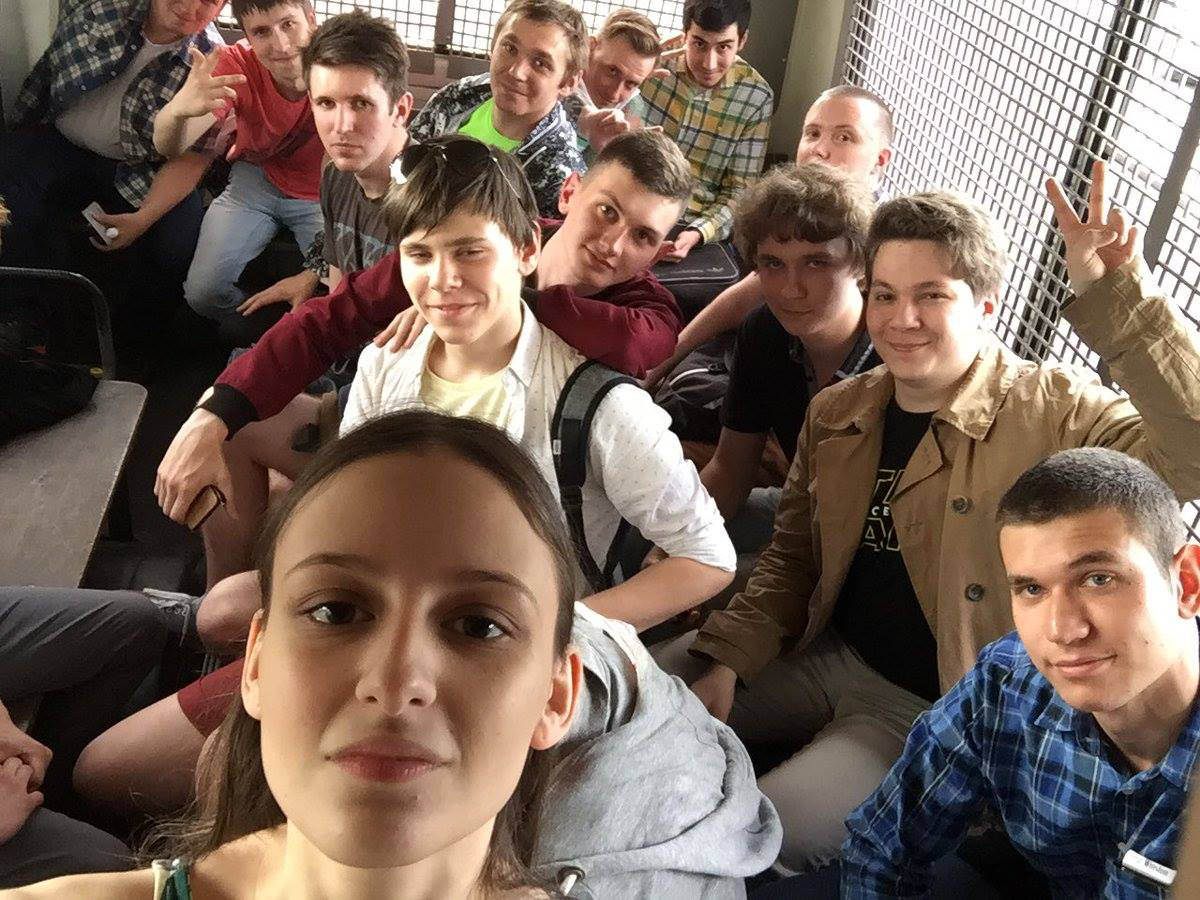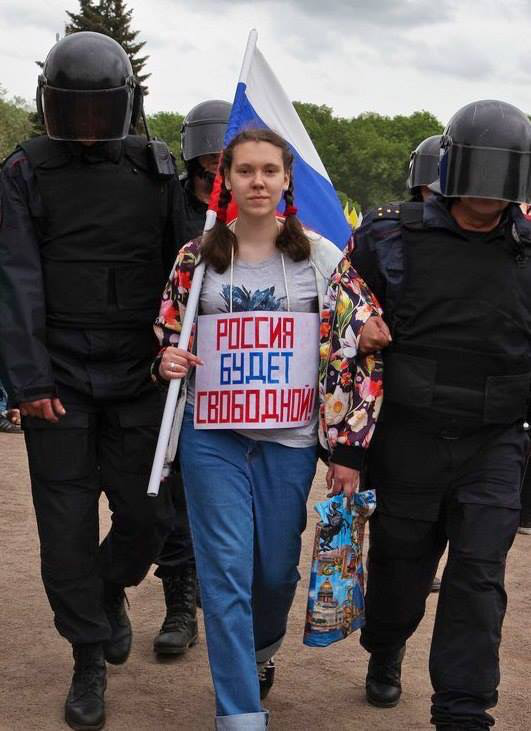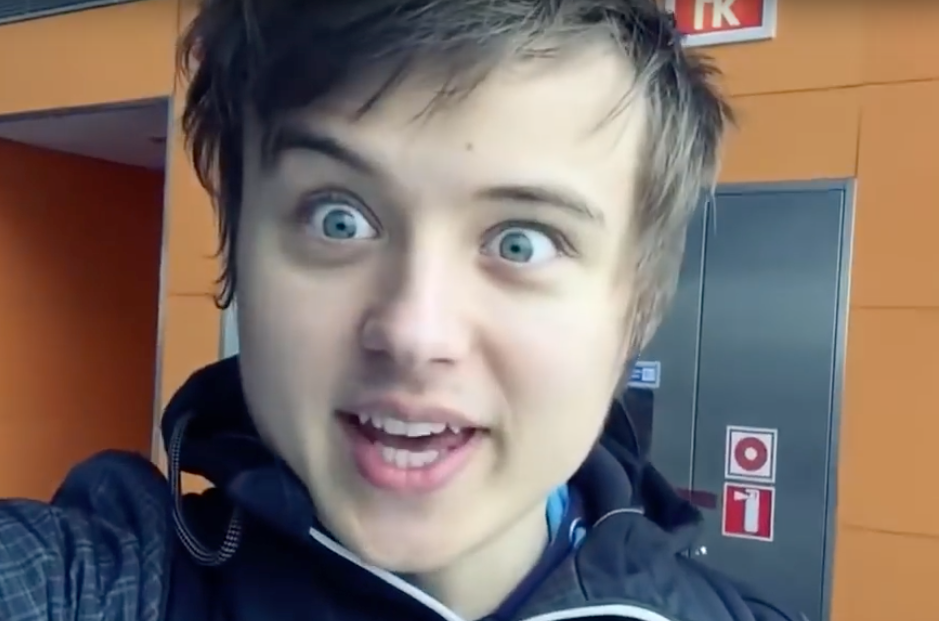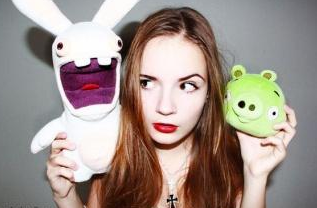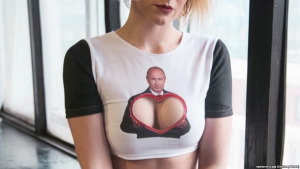The posters read: “Corruption steals our future”, “Miserable cowardly thief”. The last phrase is combined with the image of a duck, which refers to the Prime Minister Medvedev, who, according to the allegation made by the opposition leader Alexei Navalny, has a custom-made duck house at one of his lavish estates.
On March 2, 2017, the Anti-Corruption Foundation, headed by Alexei Navalny, who posted on YouTube the 50-minute video report claiming that Prime Minister Medvedev has assembled “a corruption empire” of luxury properties, yachts and vineyards. By now this video has amassed more than 23 million views.
The video triggered the largest political demonstrations in five years, that took place on March 22, with up to 60,000 people taking to the streets across Russia. The main difference of this demonstration from all the previous ones was the unusually high percentage of universities and high schools students.
Navalny, who seeks to participate as a candidate in the next year presidential election, called Russians to again go out onto the streets on June 12. June 12 is an official national holiday, Russia Day, dedicated to the 1990 declaration of sovereignty.
According to police reports, on this day 3.8 million people participated in around 3,000 patriotic events across the country. Moscow Tverskaya Street, which leads up to the Kremlin and Red Square, was hosting historical re-enactments of Russian military achievements of different centuries. Over 6,000 costumed re-enactors participated. Over 270,000 of Muscovites and tourists visited Tverskaya Street to take part in the festivities,
Alexei Navalny got official permission to have his rally on Russia Day in the less central Sakharova street. Authorities, while permitting the rally, forbade at the last moment all providers of sound equipment necessary for large gatherings to rent their equipment to Navalny and his Anti-Corruption Foundation. A meeting without sound equipment seemed to be meaningless, and outraged Novalny called the protesters to move to Tverskaya street and join the crowds celebrating Russia Day.
Police claim that 5,000 protesters arrived at Tverskaya Street. Actually, it was impossible to determine the figure, because all were together: the protesters, the tourists, the audience of the shows and the performers in historical costumes.
Still, especially noticeable was the that there was an even higher percentage of very young people among the protesters than on March 22.
The young protesters were strolling in the street, mixing with others. Some of them were chanting: “Putin out!” and “Russia without thieves!”.
Police arrived.
The protest rallies took place not only in many cities all over the country. A total of 1720 people were arrested by police across the country.
Here is the comment by prominent Russian journalists Nikolay Svanidzes on these arrests:
“If they arrested 862 people, in my opinion, it means that they arrested almost every fifth person. I do not understand the selection criteria. Because if everyone who came has violated a law, then all five thousand should be arrested. Following this absurd logic, it is necessary to arrest everybody! If 20 thousand will come, 20 thousand should be arrested. And if not, then what law was broken by every fifth of the demonstrators? What did they do? Attacked guards, police? Plucked buttons from their uniforms? Or they waved the Russian flags? Or they read the lines from the Constitution of the Russian Federation? What did they do?”
Besides the unprecedented amount of young people among protesters, there was another characteristic of the Moscow rally of June 22, which made it different from the previous protest activity. This time it was difficult to distinguish between pro–Putin crowds celebrating Russia Day and anti-Putin activists. Protesters, who came to protest against corruption, were stressing their patriotism and many of them were carrying Russian flags. So crowds of politically indifferent people could see police arresting boys and girls waving Russian flags. It’s possible that police actions, in this case, produced results opposite to planned: it turned a lot of Putin sympathizers into protesters.
Many Russian commentators think the recent demonstrations show an important turn in the Russian social life: the change of generations. A new generation appeared on the social stage: a generation that gets its information not from state TV, but from the Internet. This generation had grown up after the fall of communism and doesn’t know nor share fears of their parents.
A popular journalist Yulia Latynina published in the paper Novaia Gazeta an article, entitled: “The end of TV. An unstoppable process began that is comparable to the Reformation.”
Latynina wrote:
“For many years the country has been living with the familiar mythology, via the “zombie box” (Russian nickname for TV. ) According to this hypothesis, some large number of Russians – maybe not 90%, maybe not 85%, but certainly the majority – determines their thinking by what they see on TV.
“Question: There are more than 140 million people in Russia, how many of them are watching the program “Time”? (the most popular Russian TV news program. S Ts.)
Answer: 6 million people, which is less than 5% of the population. This is the official statistics. It’s easy to check.
Question: What is the average age of the audience for the program “Time”? Answer: 63. This is also official statistics.
In other words: that 5% who watch the program “Time”, they are not the most active part of the population.
Question: How many people watched the Navalniy’s anti-Medvedev video? Answer: Just the YouTube the counter has passed 17,5 million views (by now it is 23 million.) This figure, given other media platforms, can be at least doubled.
In other words, every second citizen of Russia under the age of 50 saw the film of Navalny. This estimation roughly agrees with the data of the Levada Center that 38% of the population either watched Navalny’s film or heard about it.
Zombie box is no more. The absolute majority of the Russian active population receives information in a different way.
“The program “Time” is watched by 6 million senior citizens, and the Navalny’s film was watched by 35 million young people…”
According to another journalist, Alexander Troitsky:
“There is such a thing as popular bloggers. They are watched by millions of young people who hang on every word. There are bloggers who are engaged in politics, for example, Kamikaze, Navalny, but they usually have a little over one million subscribers. There is a pro-Kremlin blogger Sharii; he, too, has similar amount of subscribers. With such amount of subscribers, Navalny attracts to the streets a certain number of people, certainly his fans. Now, imagine, there are other bloggers, for example, Ivangai, who has 11 million subscribers; but he is not involved in politics.
“He is the most popular and respected blogger of the Russian YouTube. And so, Ivangai yesterday, in his own peculiar manner of course, invited everyone to take part in the competition held by Navalny, which called for shooting investigating videos of their own and sending them to Anti-Corruption Foundation…
“There is information war between the Internet and TV. On opposite sides are people over 40 and people under 30. It is useless to try to frighten the young people, as well as hoping to instruct them to follow the ‘proper path’. Youth is waiting for its time, and this time will come. Young people are the only true opposition. If they trust Navalny, and he will let them down, they will ban him by the traditions of the YouTube, and he will be no more because they just will stop being his subscribers. Putin does not have subscribers, he has voters. The youth is waiting. As soon as Navalny (or someone else) will have more subscribers than Putin (or someone else) has voters, the power will be replaced. This can happen at any minute.”
Kirill Martynov, the editor of the political division of the newspaper “Novaya Gazeta”w, said:
“I overestimate, perhaps, the historical significance of one event (let’s see what happens next with this), but now, in general, one important idea has developed. That is, there was a figure of a 20-year-old young man, a student of a good Moscow University, who goes to the city center on the 12th of June, on a state holiday, with a Russian flag, and for this he is put in a paddy wagon.
“Well, yes, I feel more and more that our Kremlin bosses believe that time belongs to them and that they can live in an eternal 2007. But it is evident by many signs that this does not work. And one can see that, in fact, unlimited human resources are gathering now around Navalny. The people, who study in the Russian schools, face total lies on the Russian TV, in Russian society and some of them develop moral, political feeling. They are afraid of nothing. Why should they be afraid? And now we can see how these 20-year-olds, 18-year-olds, even younger people, suddenly go out on the streets with these Russian flags. And next year there should be many more of them, and next year still more.”
Of course not everybody in Russia shares the opinions of the writers quoted above. Nevertheless, recent actions of Russian government show attempts to get control over the Internet, which was neglected by them until now.
State Duma had a special session devoted to the activity of bloggers.
Sergei Mironov, who leads the faction of Just Russia party in Duma, called upon the government to urgently develop and implement some concept, acceptable for the young people, otherwise this will be done by the “enemies of Russia”.
Mironov said: “A seducer sits in social networks who teaches to despise your Motherland, do not love your Motherland. Young people find it all in the networks. Young people tend to take risks, and foreign factories of thought today very successfully impose through the social network a variety of models of searching for thrills.”
The members of Duma invited the 19-year-old Alexandra Balkovskaya, known by her Internet nickname Sasha Spieberg, to their gathering. According to YouTube, Sasha is one of the top ten most popular Russian bloggers. Sasha talks with her subscribers about cosmetics, video games and her daily life.
That’s how Sasha opened her speech to lawmakers:
“Hello, my name is Sasha Spielberg, I’m a video blogger, and my audience exceeds 10 million people. I am not strong in the names of political parties, but I understand they communicate with a large audience. The fact that I am here is a sign that the state recognizes the importance of the video blogosphere and the importance of leaders of opinion. This is important.”
Sasha Spielberg informed the members of Duma that she has a hamster, that she once took a bath of chips, and that her only attempt to get closer to some kind of politics was her videotaped conversation with Minister of Culture Vladimir Medinsky that got less than a million spectators, and, according to Sasha’s measure, was an obvious failure.
The Duma made a decision to create a new organization, the Council of Bloggers. None of the most popular bloggers joined it. This week the first meeting of the Council took place. Most of the speakers at the meeting were representatives of the government.
Another attempt to attract young people to governmental politics was made by a non-governmental movement #NET. The political principle of the movement is formulated on its website: “We are for Putin. To support Russian power means to oppose the world power. Those who are against Putin are for the foreign world master. “
Anti-Corruption Foundation calculated that in 2015 the projects of the movement #NET received 70 million rubles in state’s grants.
The last project of the movement #NET is the line of very special t-shirts. Makar Vikhlyantsev, the founder of the movement #NET, stated that the line is for those “who do not need push up bras to demonstrate the virtues of their political position.”
This initiative could be considered just a silly joke. But some representatives of the Russian government think differently. To name just one, the director of the Center for Political Studies at the Governmental Finance University Pavel Salin, expressing satisfaction that after the actions of Navalny the authorities finally realized that they need to work more with youth, found the idea of the new t-shirts very productive.
Salin wrote: “The idea to use girls with impressive forms is absolutely correct and not new; any manipulation, including political, is built on basic instincts, and it has always been so.”
Most of the Russian political commentators think that Navalny has no chance to become Russian president next year. Probably it is so. Nevertheless, observing “activity” of his opponents makes one to believe in the possibility of the opposite.

